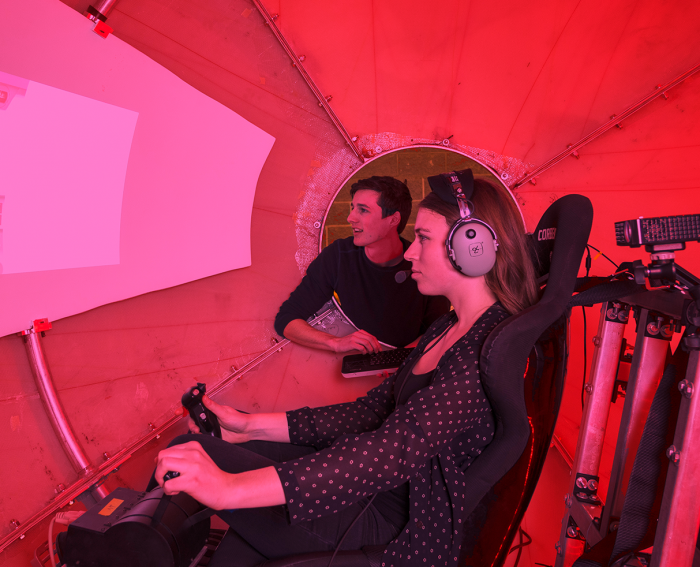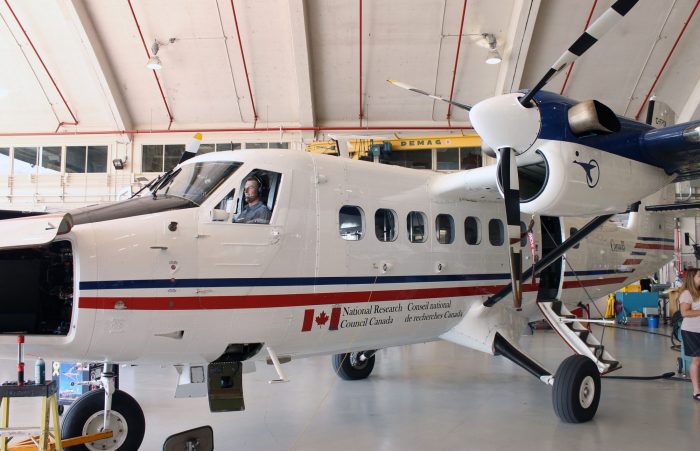If you find aircraft and spacecraft interesting and exciting, Aerospace Engineering could be the program of study for you. Canada’s aerospace industry has annual revenues of about $22 billion and employs more than 80,000 people. It is a vigorous, innovative and highly competitive industry with a worldwide reputation for leadership in a number of fields, including commuter and business aircraft, small gas turbine power plants, aircraft simulators, communications satellites and guidance systems.
Choosing the Right Program
The BEng program in Aerospace Engineering is fully accredited by the Canadian Engineering Accreditation Board. When you graduate from the program, you will meet the educational requirements for registration as a professional engineer.
There are four streams in the Aerospace Engineering program: aerodynamics, propulsion, and vehicle performance; aerospace structures, systems, and vehicle design; aerospace electronics and systems; and space systems design. All streams provide a foundation in the key disciplines of dynamics, thermofluids, solid mechanics and materials—disciplines that are essential to the design of airframes, space platforms and propulsion systems.
In the aerodynamics, propulsion, and vehicle performance stream, you specialize in aircraft aerodynamics, performance, control and propulsion technologies. The aerospace structures, systems, and vehicle design stream focuses on lightweight structures and materials for aircraft and space vehicles. The aerospace electronics and systems stream concentrates on modern aircraft and spacecraft electronics for navigation, guidance, communication and remote sensing. Included are courses on software structures, signal processing, electronics and telecommunications. The space systems design stream emphasizes spacecraft and satellite design and mission planning, with courses dedicated to orbital mechanics, spacecraft design, communication, propulsion and dynamics.
All of the aerospace streams begin with a common set of courses that provide a foundation in engineering, mathematics and science. These are followed by increasingly specialized courses throughout the remainder of the four year program.
Classes you’ll be taking in the aerospace engineering program are curated to give you the strongest foundation for your future. Click here to see which courses you’ll be taking.
Admission Requirements
For admission to Engineering Programs, you must have an Ontario Secondary School Diploma (OSSD) or equivalent, including a minimum of six 4U/M courses.
Equivalent courses may be substituted at the appropriate 4U level.
Prerequisites: Advanced Functions, Chemistry, Physics
At least one of the following: Calculus and Vectors (strongly recommended), Biology, Earth and Space Science
The Carleton Advantage
Carleton University established the first Bachelor of Engineering (BEng) degree program in Aerospace Engineering in Canada. Carleton’s program is recognized for:
- a wide range of topics offered within four streams of study;
- a unique and challenging final-year design project that emulates a design office project at an aerospace firm;
- an emphasis on problem-solving skills, and hands-on laboratory and design work; and
- excellent scholarships for high-standing students
Our Laboratory and Research Facilities
For every 3 hours of class, you have 3 hours of lab time which culminates in your 4th year with producing a tangible capstone project, which is presented in a fair to professors, peers, and industry.
Interested in seeing some of the labs you’ll be working in?
Your Future Opportunities
With your Bachelor’s of Aerospace Engineering, you will be well prepared for a challenging career within the aerospace design and manufacturing industry, or in airline and space operations, government research laboratories, and aircraft certification and accident investigation authorities.
Carleton’s Co-Op program is a great way to make your first strides in your field. Our program is closely associated with a wide range of private and public service employers seeking Aerospace and Mechanical Engineering candidates, giving students valuable work experience and contacts that will benefit them in the future.

